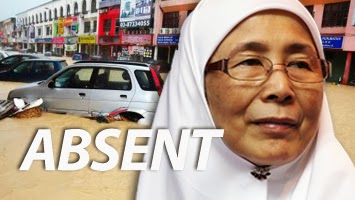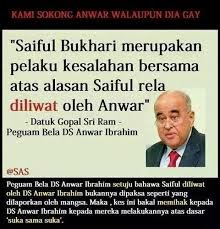Malaysiakini
When government opted to appoint Muhammad Shafee Abdullah as lead prosecutor in handling Opposition Leader Anwar Ibrahim’s appeal, it implied that Anwar’s case was too big and too serious that the Attorney-General and his team was not confident enough to conduct the appeal.
Maybe, in the eyes of the AG, the murder of Mongolian translator Altantuya Shaariibuu murder was less significant than Anwar’s ‘crime' so much so that he did not consider fit and proper to engage a private lawyer to secure conviction for political analyst Abdul Razak Baginda (left) so that Razak could have been served with a death warrant.
Razak was acquitted by the High Court but the AG did not lodge an appeal against such a decision. On the other hand, when Anwar was released by the High Court, the AG proceeded with the appeal and used public funds to engage a lawyer who is well known to charge exorbitant legal fees for his services.
Both Razak and Anwar are linked to the Prime Minister Najib Abdul Razak.
Razak was Najib’s close associate and Anwar is his political enemy. His associate is now in London and his political rival landed in Sungai Buloh’s prison.
Double standards
While it is not wrong to engage a private lawyer to helm the prosecution team, it is definitely not right to practice double standards in any prosecutorial exercise of powers.
It is also not right for the government to hide from the public the actual fees it has to pay to secure Shafee’s service.
It goes without saying that when public funds are used , the public has every right to know how much the government has paid Shafee.
Many Pakatan Rakyat members of Parliament including myself, have sought this information in Parliament, but the government has refused to divulge it citing that such information is classified thus protected under the Official Secrets Act .
Whilst matters dealing with national security ought to be duly protected under the Act, the government must be seriously joking to imply that Shafee’s legal fees would endanger the nation should such information be revealed to the public.
The government cannot run away from the public perception that Anwar’s trial was politically-motivated.
To begin with, you do not see in any other criminal cases that a complainant is allowed to make a telephone call to the inspector-general of police on the latter’s direct line. But it happened in the Anwar’s trial. Neither does any ordinary complainant in any criminal trial would have been given a chance to go to the prime minister’s private residence, as was done by sodomy complainant Mohd Saiful Bukhari Azlan.
Adding salt to injury
When Shafee helmed the prosecution team in Anwar’s appeal, it only enhanced such a perception, and to add salt to injury, Shafee continued his onslaught against Anwar even after the Anwar’s conviction.
Such an unprecedented attack only reaffirms the popular belief that political conspiracy has been deeply embedded in Anwar’s saga. The court of law may reject the defence of political conspiracy but not in the court of public opinion.
Despite his vast experience handling criminal trials, Shafee is unfortunately infected by unnecessary overzealousnes and committed the gravest mistake by condemning Anwar for his refusal to give evidence under oath.
False logic
Shafee’s false logic can be easily detected when he compared Anwar with Saiful.
His logic goes like this: Saiful was brave enough to testify in court and subject to strenuous cross-examination by the defence lawyers, so why did Anwar refuse to undergo the same process?
This argument is based on the erroneous presumption that both the complainant and the accused person in a criminal trial bear the same responsibility as far as in giving their testimonies in court is concerned. Herein lies Shafee’s Achilles heel.
Needless to say that the accused is presumed innocent until proven guilty and he is not legally-obligated to say anything in a criminal trial.
Even when the defence is called, the law allows the accused, like Anwar, to opt for one of the three options available to him. He may choose to remain silent or give evidence without oath or give a sworn evidence and subjected to cross examination.
Nothing to do with bravery
The ball is completely in the accused’s court to elect one of these available options. In other words, the accused in any criminal trial is not a witness that can be compelled.
The same rule does not apply to Saiful, being the complainant in the Anwar’s trial. There is no question that Saiful was brave enough to testify and ready to be subjected to rigorous cross examination.
Being the complainant he has no option but to testify in court. He was a witness who could be compelled. Hence his evidence has nothing to do with his bravery as Shafee tried argue.
Being a senior practitioner, Shafee should have not made any unsolicited remarks against Anwar when Anwar elected to give evidence in the dock. His comment that Anwar was a coward and would have fainted if cross-examined was really unnecessary and uncalled for.
After all Anwar was not the first accused in this world who gave evidence in the dock. Anwar did nothing unusual by resorting to such an option . What is really unusual is Shafee going crazy by condemning Anwar, outside the courtroom, for resorting to a legal option available to him.
Truth be told, Anwar had given sworn statements in his last two trials and as before he maintained the defence of political conspiracy. Thus it is incorrect to associate Anwar with cowardice just because Anwar departed from his usual choices.
In fact, Shafee should have accused Prime Minister Najib Abdul Razak and his beloved wife Rosmah Mansor of cowardice par excellence for blatantly refusing to give evidence when they were summoned by Anwar’s legal team as witnesses for the defence. Both Najib and Rosmah applied to set aside the subpoenas issued against them.
No need for cheap stunts
As long as Anwar chose a recognised defence, he should not have been subjected to any adverse comments by anybody, let alone the prosecutor like Shafee.
Apart from the defence of political conspiracy, Anwar’s prime defence in this trial was a lack of penetration. Since the penetration stands as an essential ingredient of the charge under Section 377B of the Penal Code which Anwar was charged under, the lack of it should have exonerated him.
Anwar’s lawyers believed that when the prosecution failed to prove such an essential ingredient, there was no necessity for Anwar to give a sworn statement in order to plug in the loopholes of the prosecution’s case.
In a criminal trial, the duty of the accused is not to disprove or to unlock the prosecution’s proof. On the contrary, the law only obligates the accused to cast reasonable doubt of the prosecution’s case.
Casting doubt of the prosecution’s case may be done by various modes and it is never confined to a sworn evidence by the accused in a witness box. To blame Anwar for refusing to testify on oath reflects shallow understanding of the operating mechanism of criminal law.
Viewed from this perspective , I would submit that Anwar did the right thing by calling his expert witnesses to cast the doubt on the evidence offered by the prosecution on the issue of penetration. Anwar himself has neither expertise nor obligation to give evidence on oath to disprove penetration.
To his credit , the High Court judge was convinced with the evidence of those experts and in turn held there were reasonable doubts and thus unsafe to convict Anwar.
Shafee is ready to swear in the holy land of Mecca to prove Anwar’s guilty. To be honest, in resorting to this stunt, I must say that I see no difference between Shafee and Saiful. So naive and so desperate!
Maybe I need to remind Shafee that he need not resort to all these cheap stunts if he is truly convinced that Anwar is guilty.
Maybe Shafee is unaware that Abu Jahal, the pagan Arab and the strongest opponent of the Prophet Muhammad also used to pray in the holy land asking the Lord to destroy the Prophet Muhammad for he believed the Prophet Muhammad guilty of causing disunity among the Arabs.
But God operates in mysterious ways. Indeed, Abu Jahal was ultimately destroyed.
MOHAMED HANIPA MAIDIN is a lawyer and PAS MP for Sepang.



































































.jpg)











